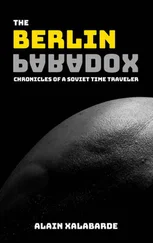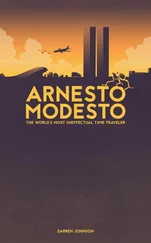James Gleick - Time Travel
Здесь есть возможность читать онлайн «James Gleick - Time Travel» — ознакомительный отрывок электронной книги совершенно бесплатно, а после прочтения отрывка купить полную версию. В некоторых случаях можно слушать аудио, скачать через торрент в формате fb2 и присутствует краткое содержание. Год выпуска: 2016, Издательство: Knopf Doubleday Publishing Group, Жанр: Старинная литература, на английском языке. Описание произведения, (предисловие) а так же отзывы посетителей доступны на портале библиотеки ЛибКат.
- Название:Time Travel
- Автор:
- Издательство:Knopf Doubleday Publishing Group
- Жанр:
- Год:2016
- ISBN:нет данных
- Рейтинг книги:5 / 5. Голосов: 1
-
Избранное:Добавить в избранное
- Отзывы:
-
Ваша оценка:
- 100
- 1
- 2
- 3
- 4
- 5
Time Travel: краткое содержание, описание и аннотация
Предлагаем к чтению аннотацию, описание, краткое содержание или предисловие (зависит от того, что написал сам автор книги «Time Travel»). Если вы не нашли необходимую информацию о книге — напишите в комментариях, мы постараемся отыскать её.
Time Travel — читать онлайн ознакомительный отрывок
Ниже представлен текст книги, разбитый по страницам. Система сохранения места последней прочитанной страницы, позволяет с удобством читать онлайн бесплатно книгу «Time Travel», без необходимости каждый раз заново искать на чём Вы остановились. Поставьте закладку, и сможете в любой момент перейти на страницу, на которой закончили чтение.
Интервал:
Закладка:
Only a few paid Wells the compliment of analyzing his fantastic notion logically. They found it illogical. “There is no getting into the Future, except by waiting,” wrote Israel Zangwill in the Pall Mall Magazine, wagging a stern finger. “You can only sit down and see it come by.” Zangwill, himself an occasional novelist and humorist, soon also to be a famous Zionist, thought he understood time quite well. He admonished the author:
In verity there is no Time Traveller, Mr. Wells, save Old Father Time himself. Instead of being a Fourth Dimension of Space, Time is perpetually travelling through Space, repeating itself in vibrations farther and farther from the original point of incidence; a vocal panorama moving through the universe across the infinities, a succession of sounds and visions that, having once been, can never pass away…
(Zangwill had clearly been reading Poe: vibrations indefinitely extending through the atmosphere—“no thought can perish”—and this sentence, too, sails indefinitely onward.)
…but only on and on from point to point, permanently enregistered in the sum of things, preserved from annihilation by the endlessness of Space, and ever visible and audible to eye or ear that should travel in a parallel movement.
Despite his objections Zangwill couldn’t help but admire Wells’s “brilliant little romance.” He shrewdly noticed that The Arabian Nights had employed a sort of time-machine precursor: a magic carpet that traverses space. Meanwhile, even in 1895, Zangwill seemed to understand certain peculiar implications of time travel—the paradoxes, we will soon say—better than Wells himself.
The Time Machine looks one way: forward. Ostensibly Wells’s time machine could travel to the past with a reverse throw of the lever, but the Time Traveller had no interest in going there. And a good thing too, says Zangwill. Just think what difficulties would be entailed. Our past had no Time Traveller barging through. A past that included a Time Traveller would be a different past, a new past. None of this was easy to put into words:
Had he travelled backwards, he would have reproduced a Past which, in so far as his own appearance in it with his newly invented machine was concerned, would have been ex hypothesi unveracious.
Then there’s the problem of meeting oneself. Zangwill becomes the first to notice this, and he will not be the last:
Had he recurred to his own earlier life, he would have had to exist in two forms simultaneously, of varying ages—a feat which even Sir Boyle Roche would have found difficult.
(His readers would recognize Roche as the Irish politician who said, “Mr. Speaker, it is impossible I could have been in two places at once, unless I were a bird.”) *1
The book reviewers came and went, and before long philosophers got into the game. When they first took notice of time travel it was with a certain embarrassment, like a symphony conductor unable to look away from an organ grinder. “A frivolous example drawn from contemporary fiction,” said Professor Walter Pitkin at Columbia University, writing in the Journal of Philosophy in 1914. Something was stirring in science—the realm in which time was a measurable and absolute quantity known familiarly as t —and philosophers were uneasy. In the first years of the new century, when they turned to the subject of time, they had one thinker above all to contend with: the young Frenchman Henri Bergson. In the United States, William James, who might otherwise have been resting on his laurels as the “father of psychology,” found new vitality in Bergson. “Reading his works is what has made me bold,” James said in 1909. “If I had not read Bergson, I should probably still be blackening endless pages of paper privately, in the hope of making ends meet that were never meant to meet.” (He added, “I have to confess that Bergson’s originality is so profuse that many of his ideas baffle me entirely.”)
Bergson asks us to remember how artificial is the notion of space as an empty homogenous medium—the absolute space announced by Newton. It is a creation of human intellect, he notes: “We may as well say that men have a special faculty of perceiving or conceiving a space without quality.” Scientists may find this abstract empty space to be useful for calculating, but let’s not make the mistake of confusing it with reality. Even more so with time. When we measure time with mechanical clocks, when we draw diagrams where time is an axis on a graph, we may fall into the trap of imagining time to be merely another version of space. To Bergson, time t, the time of the physicists, sliced into hours, minutes, and seconds, turned philosophy into a prison. He rejected the immutable, the absolute, the eternal. He embraced flux, process, becoming. For Bergson, the philosophical analysis of time could not be divorced from our human experience of it: the overlapping of mental states, the segue from one to the next that we experience as duration— la durée.
He held time apart from space rather than commingling the two: “Time and space begin to interweave only when both become fictional.” He saw time, not space, as the essence of consciousness; duration, the heterogeneous tide of moments, as the key to freedom. Philosophers were about to follow physics down a new path, and Bergson would be left behind, but for now he was hugely popular. Crowds thronged his lectures at the Collège de France, Proust attended his wedding, and James called him a magician. “Dive back into the flux then,” cried James. “Turn your face toward sensation, that flesh-bound thing which rationalism has always loaded with abuse.” Here he parted company with physics.
What really exists is not things made but things in the making. Once made, they are dead….Philosophy should seek this kind of living understanding of the movement of reality, not follow science in vainly patching together fragments of its dead results.
Pitkin seems to have felt that he needed to rescue the poor scientists from Bergson’s onslaught. Described by Time magazine in a brief moment of fame as “a man of many ideas, some of them large,” he was a founding member of a short-lived movement that called itself new realism. In his 1914 essay he declared that he liked some of Bergson’s “conclusions” but despised his “entire method,” particularly the rejection of scientific process in favor of psychological introspection. Pitkin proposed to clear up the space-time conundrum by means of logical proof. He would embrace the physicists’ t and t ′ and t ′′ and yet he would prove once and for all that time is different from space. To wit: we can move hither and yon in space, but not in time. Or rather, we do move in time, but not freely: “a thing moves in time only by moving with all other things.” And how would he prove this? In a most unexpected way:
To make the proof as simple as possible, I shall present it in the form of a sober criticism of one of the wildest flights of literary fancy which that specialist in wild flights, H. G. Wells, has indulged in. I refer, of course, to his amusing skit, The Time Machine.
It was the first but not the last time that Mr. Wells’s amusing skit would impose itself upon the attention of this august journal.
“You cannot leap back into the thirteenth century, nor can a man of that period hop into our own,” wrote Pitkin. “Mr. Wells would have us imagine a man at rest in the space dimensions, but moving with respect to the time of that space field. Very well! Let us do our noblest to play the game. What do we find? Something very disconcerting indeed. Something which, I fear, will make time-touring very unpopular among sedate people.”
Читать дальшеИнтервал:
Закладка:
Похожие книги на «Time Travel»
Представляем Вашему вниманию похожие книги на «Time Travel» списком для выбора. Мы отобрали схожую по названию и смыслу литературу в надежде предоставить читателям больше вариантов отыскать новые, интересные, ещё непрочитанные произведения.
Обсуждение, отзывы о книге «Time Travel» и просто собственные мнения читателей. Оставьте ваши комментарии, напишите, что Вы думаете о произведении, его смысле или главных героях. Укажите что конкретно понравилось, а что нет, и почему Вы так считаете.












